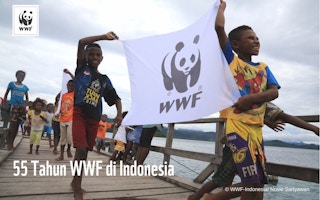The World Wide Fund for Nature (WWF), one of the world’s largest environmental non-government organisations (NGO), has halted much of its forest conservation work in Indonesia after the government cancelled its work permit.
To continue reading, subscribe to Eco‑Business.
There's something for everyone. We offer a range of subscription plans.
- Access our stories and receive our Insights Weekly newsletter with the free EB Member plan.
- Unlock unlimited access to our content and archive with EB Circle.
- Publish your content with EB Premium.
The Indonesian Ministry of Environment and Forestry’s termination of its memorandum of understanding (MOU) with WWF for its Forest-Species Programme will take effect on 31 December this year, according to five sources with knowledge of the matter.
The decision, made in early October, deals a major blow to the NGO’s ambitions in a country facing a laundry list of environmental challenges, which include threats to its rainforests that are among the world’s most powerful carbon sinks.
It means that WWF-Indonesia will stop working with the environment ministry on field conservation work in national parks for its Forest-Species Programme, which includes duties such as patrolling parks to detect threats to protected areas.
But WWF-Indonesia remains a legal entity in Indonesia and can continue advocacy work on forests. The cancellation of the agreement does not affect the NGO’s other programmes, which include climate and energy, fisheries, and fresh water habitats. WWF has worked in Indonesia for 57 years.
All NGOs with an office and permanent operations in Indonesia require an MOU to do field work with the environment ministry. Eco-Business understands that WWF is actively petitioning the ministry for a renewal of its conservation work permit.
Indonesia’s rainforests are home to 12 per cent of the world’s mammals, 7 per cent of reptiles and amphibians, and 17 per cent of bird species. Over a 10-year period, WWF has discovered 400 new species on the island of Borneo alone.
WWF has 24 field offices in Indonesia and employs 500 people across the country working on various programmes. WWF employees doing nature park conservation are expected to be redeployed to other programmes if the agreement is not renewed in 2020.
The cancellation has already affected the work of NGOs that WWF is aligned with in Indonesia, according to sources familiar with its operations.
WWF was not credited in a major report launched last week by a coalition of international and local NGOs. The report highlighted the environmental impact of ongoing operations by big agribusiness firms on Indonesia’s carbon-rich peatlands, the development of which contributes to the haze outbreaks caused by slash-and-burn forestry that blight much of Southeast Asia every dry season.
WWF’s pivotal involvement in Eyes on the Forest, an influential on-the-ground investigative unit that tracks deforestation and the operations of big agribusiness companies working in the country, is now on hold, Eco-Business understands.
Why was WWF’s permit cancelled?
It is unclear why WWF’s work permit was voided, although Eco-Business understands it could be due to a number of factors.
One is that the agreement—signed in 1998 and valid until 2023—was outdated and based on obsolete regulations, such the number of expats eligible to be deployed in conservation work. Indonesia has, in recent years, clamped down on the number of foreigners that can work on local conservation programmes.
Another is a disagreement between the ministry and WWF over the management of forests in West Papua.
The regional government of West Papua, one of the world’s most biodiverse regions and Indonesia’s last stronghold of intact primary rainforest, declared itself Indonesia’s first conservation province in 2015, meaning that sustainable development is to be front and centre of any economic activity, and natural areas are protected from agribusiness expansion.
The legislation, passed in March this year, was applauded by conservation groups. WWF, which has a large and highly visible presence in West Papua, is a strong supporter of the province’s conservation declaration. But according to sources familiar with the issue, WWF’s support for West Papua’s conservation declaration has not been well received by the central government in Jakarta, which is keen to grant more concessions to agribusiness companies for development.
Large areas of West Papua have already been converted for logging and palm oil interests, encroaching on land populated by indigenous communities that have lived in relative harmony with the region’s forests for thousands of years. Palm oil and other agricultural commodities also bring with them cultural conflict, since workers are typically from other parts of Indonesia, such as Java, and Papuans are often excluded from the benefits of economic development.
WWF has not commented on the news, and Eco-Business has contacted Indonesia’s Ministry of Environment and Forestry for comment.
According to sources on the ground in Indonesia, other foreign-backed NGOs will be concerned by WWF’s MOU cancellation amid rising nationalist sentiment and distrust of foreign actors in the country.
An NGO source, who requested anonymity, told Eco-Business: “The nationalist trend [in Indonesia] is real, as it is in other countries around the world. So, there is a tendency to regard international NGOs with suspicion.”










